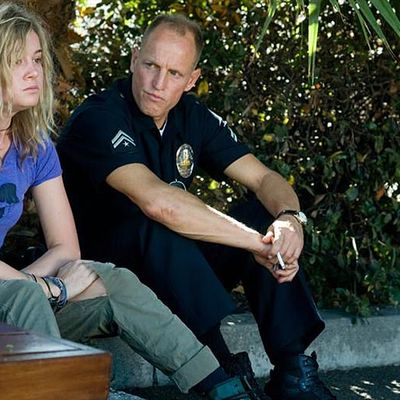
The great Woody Harrelson seemed destined for an endless string of supporting turns as quirky and/or lovable screwups and weirdos until 2009’s The Messenger, in which he displayed inner reserves of tough-guy cool (and scored a much-deserved Oscar nom) playing part of a two-man Army Casualty Notification Team. Oren Moverman, who directed both that film and Harrelson’s latest, Rampart, clearly sees things in the 50-year-old actor that others have missed, and it’s a good thing, too. In Rampart, that same unlikely cool shines through again; but this time, Moverman catches the hard-ass in mid-collapse.
The film takes place in 1999, when the so-called Rampart Scandal, involving deep corruption within the LAPD’s anti-gang units, was threatening to consume the city’s police force. Harrelson plays Dave Brown, a blustery cop and Vietnam vet who, when he isn’t humiliating female colleagues and behaving violently toward suspects, listens to a lot of right-wing radio and chills at home in a rather unorthodox living situation: He co-habitates with two sisters (Cynthia Nixon and Anne Heche) with whom he’s had two daughters. That this brute can be a pushover in a house full of females seems at first like a redemptive bit of character shading, but it’s soon clear that the fortress Brown imagines his home life to be is as much a myth as the steely professional exterior he tries to cultivate.
The whole film, indeed, seems to capture a moment when all his many illusions of safety are beginning to fall apart – Brown’s home is deteriorating, and his career (under siege by numerous scandals) is in serious danger, not to mention his status as a kind of folk hero in the department (thanks mainly to an incident some years ago wherein he killed a known rapist). As can be gleaned from the title, however, the collapse isn’t just a personal one – as the film proceeds, Brown seems to represent the very fabric of society, frayed and tattered by disillusionment on all levels. The cops do not protect, the politicians do not lead, the men do not provide, and Dave Brown is starting to lose his mind.
Moverman’s unhinged shooting style echoes the increasingly unbalanced state of his central character, almost to a fault. Indeed, at times you might be unsure of how much of what’s onscreen is even meant to be taken at face value. There’s a curiously binary quality to many of Brown’s exchanges; he so often seems to be alone with people that we wonder if these characters are in fact real. Is the whole movie going to turn out to be a fever dream?
Moverman’s film keeps threatening to spin out of control; don’t look for easy resolutions or clear narrative lines here. What keeps it all together, ultimately, is the bravura performance at the heart of this ever-unfolding nightmare. Harrelson is a force of nature here, and watching him takes your breath away. You never quite know where this tragic figure is headed – whether he’ll turn into a fire-breathing monster or just dissolve into the night. This is a man alternately powerful and broken, intimidating and pathetic.


